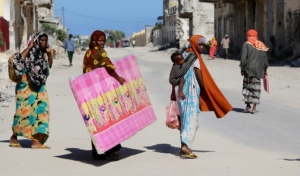Human Trafficking in Djibouti: A Call to Action
 In the heart of East Africa, Djibouti faces a multifaceted battle against human trafficking. Despite the conclusion of its Civil War in 1994, Djibouti remains fragile, with ongoing clashes. Insufficient infrastructure capacity and resources prevent authorities from effectively tackling the issues of human trafficking in Djibouti. Corruption and limited policy options further compound the challenges. However, amidst these constraints, the Djibouti government has shown an increased commitment to combating these crimes.
In the heart of East Africa, Djibouti faces a multifaceted battle against human trafficking. Despite the conclusion of its Civil War in 1994, Djibouti remains fragile, with ongoing clashes. Insufficient infrastructure capacity and resources prevent authorities from effectively tackling the issues of human trafficking in Djibouti. Corruption and limited policy options further compound the challenges. However, amidst these constraints, the Djibouti government has shown an increased commitment to combating these crimes.
Human Trafficking in Djibouti
Djibouti serves as a transit point for various illegal activities, including human trafficking. The country’s central location on the Horn of Africa and its porous maritime, mountain and desert borders make it susceptible to being used as a hub for this illicit trade. According to the U.S. Department of State’s Trafficking in Persons Report 2023, Djibouti is a source, transit point and destination country for men, women and children subjected to forced labor and sex trafficking. The report estimates that there are several hundred people trafficked through Djibouti each year. The most vulnerable groups include migrants and refugees from neighboring countries, particularly Ethiopia and Somalia. These individuals, seeking better opportunities, often fall prey to traffickers who lure them with false promises of work or a better life.
Types of Work and Victims
Victims of human trafficking in Djibouti end up in various forms of exploitation. Many are subject to forced labor in domestic work, construction, agriculture and the informal sector. Women and girls are vulnerable to sex trafficking, with some being forced into prostitution within the country or trafficked to other nations.
Not all victims are from Djibouti itself; many come from neighboring countries seeking better economic prospects or escaping conflict. Djibouti’s strategic location as a transit point also means that victims move through the country and then are trafficked to other destinations outside its borders.
The Link Between Human Trafficking and Poverty
Human trafficking in Djibouti is intricately linked to poverty and economic vulnerability. The lack of economic opportunities and resources in the country, coupled with high levels of unemployment and underemployment, make individuals more susceptible to the false promises of traffickers. Poverty drives many to seek better prospects elsewhere, making them easy targets for exploitation.
Government and NGO Initiatives
The Djibouti government has taken steps to combat human trafficking and improve its response to the issue. There are ongoing efforts to strengthen the anti-corruption framework, with the establishment of the National Commission for Anti-Corruption and the implementation of a new asset declaration system. However, challenges persist in terms of transparency and accountability, especially concerning politically motivated prosecutions and due process rights violations.
In terms of international cooperation, Djibouti takes part in various significant agreements related to organized crime, including the U.N. Convention Against Transnational Organized Crime (UNTOC) and the U.N. Convention Against Corruption (UNCAC). However, there is room for improvement, as the country has yet to ratify the Arms Trade Treaty, despite being viewed as an arms-trafficking hub. In a 2022 report, the U.N. Refugee Agency has also advocated for better protection services available to vulnerable populations susceptible to trafficking. The report highlights providing access to shelter and justice. These protection services also include providing better responses for unaccompanied children, to gender-based violence and trafficking.
Djibouti collaborates with regional and international initiatives and organizations to combat human trafficking. Partnerships with Arab-speaking countries, France, Turkey, Brazil, Senegal, the Netherlands, Morocco and others focus on capacity-building for law enforcement agencies. Additionally, Djibouti engages with organizations like the East Africa Police Chiefs Cooperation Organisation, INTERPOL, MENAFATF and the Horn of Africa Wildlife Enforcement Network.
Final Thoughts
To enhance law enforcement capacities, Djibouti must address training standards, equipment, communication and forensic services. Corruption remains a persistent constraint on the efficacy of law enforcement efforts, requiring further attention and reform.
Djibouti confronts a complex web of challenges in its fight against human trafficking and smuggling. Despite fragility, corruption and resource limitations, the government has shown dedication to addressing these issues. In addition, international cooperation and regional partnerships play a crucial role in combating human trafficking in Djibouti. By fostering transparency, enhancing law enforcement capacities and addressing the root causes of these crimes, lasting change there is hope the country can achieve lasting change that favors the vulnerable within its borders.
– Mari Caitlin Riggles
Photo: Flickr
